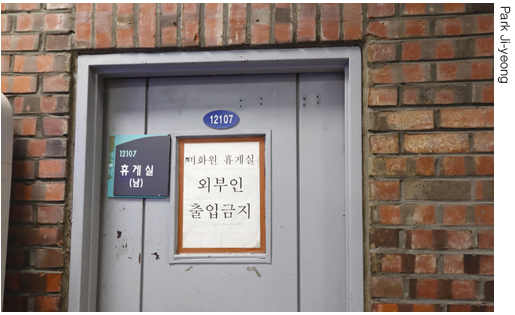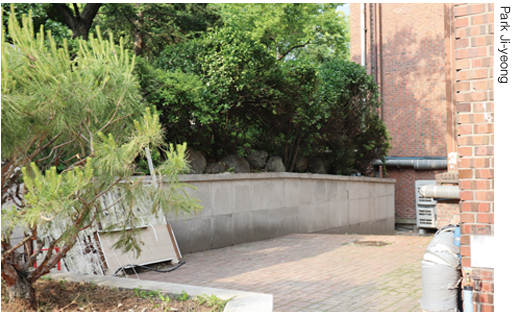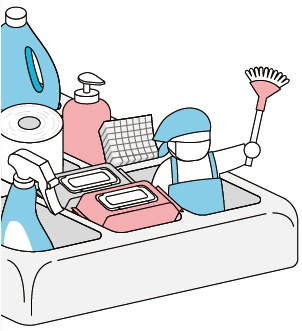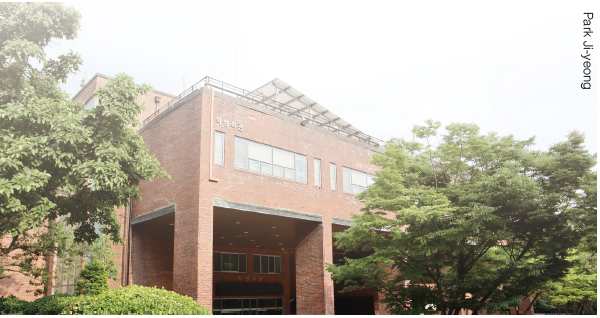Mrs. A’s Daily Life
During lunchtime, when the street is lively for a while, Mrs. A puts herself on the subway. She cannot enjoy lunchtime like everyone else because her work starts at 1 p.m. As the subway during lunchtime is relatively uncrowded, she can sit down comfortably. She arrives just before 1 p.m., briefly greets her colleagues, and gets ready for work. She puts on an apron and packs cleaning supplies, and her work begins.
Mrs. A is a cleaning worker at the University of Seoul (UOS). She is in charge of the second and fourth floors of the Central Library. There is no fixed break time during her working hours, which ends only by 10 p.m. She usually works without a break till 4 p.m. to finish her work as soon as possible. After a cycle of cleaning, she goes out for dinner with a stiff back. She comes back and sweeps and cleans each floor and the busy hallway; thus, she does not even know when the sun goes down.
She has been selected for the civil service of cleaning at the age of 59. Other businesses put the workers out at the age of 60, but she can work until the age of 65 at UOS, which she finds to be the most grateful point. As she was always a contract worker before, she used to be anxious about the renewal of her contract every eight months, but now that is not going to happen. In particular, colleagues and office workers are so good to her that she is working with much satisfaction.
As she has worked at the Central Library from the beginning, some students who regularly sit and study in the library are familiar with her. After they got to know each other, they exchanged greetings, and some students even offered her something to drink. “One day, on my way home from work, I encountered a student who was attending the law school at UOS; he greeted me happily, and it was a memorable moment,” said Mrs. A.
The last thing she wanted to say to UOS and students was “cheer up.” Whenever she sees students studying hard at the library, she feels sorry as getting a job is hard these days, and the COVID-19 pandemic has further worsened the situation. She hopes that they will achieve what they have been preparing for as soon as possible.

Mr. B’s Daily Life
Mr. B has to wake up very early in the morning because his shift starts at 7 a.m. He cleaned the Central Library for about three years before he started cleaning the Student Hall earlier this year. According to him, about 76 UOS cleaning workers take turns and clean the assigned buildings. He is looking forward to working until he turns 65, as he is satisfied with his job. Until 4 p.m., his work is to clean the outside of the building and the hallway inside the building.
He is a master in cleaning because he has worked at private institutes before he got a job at UOS, just like his colleagues. He has his own pattern of cleaning: he cleans the inside first and then the outside, and takes a short break anytime he wants.
However, he also talked about two difficulties he faces while working. First, many strangers who trespass on the building make him feel uncomfortable. Despite the announcement that school facilities would be opened only to school members due to COVID-19, outsiders have been constantly entering. This is because there is no janitor guarding the Student Hall, and the place is usually open. As one of the solutions for this problem, the restrooms on the first floor of the building are closed these days. In addition, cigarette butts on the ground at the smoking area have exhausted him. They are difficult to clean up, but there is no specific way to stop people who throw them away thoughtlessly. He wants to ask the students to notify him of what they are throwing away when dumping huge waste piles. When there is a large waste item such as a sofa or a box in the hallway, he cannot throw it away because he is unsure of its purpose.
Since the outbreak of COVID-19, Mr. B has had much less work to do. Nevertheless, he often feels sad about not being able to meet numerous students on the campus. With a new badge he received recently, he has been working proudly as one of the workers of UOS.

An Invisible Worker
UOS is mainly composed of students, faculty members, and the campus. However, some hidden people keep our campus clean, guaranteeing convenient campus life for every member of UOS, just like Mrs. A and Mr. B. A new term in Korean has appeared to indicate these people, Tu-myeong Nodongja (an invisible worker, in English). In 2012, Roh Hoe-chan, one of the members of the National Assembly of South Korea, used this term for the first time in his speech. Roh mentioned all the cleaning workers who take the bus at dawn and head to their workplaces in Seoul every day to clean up the buildings before the employees arrive, and called them “invisible” to make the citizens recognize their existence. Even though they are the ones who bring shine to the buildings, people usually do not notice their efforts. Those workers have been known as “invisible” workers because people tend to take the services they provide for granted. Nevertheless, at every workplace, each employee has their role in certain works; things cannot be perfectly operated in the absence of even one of them, including the invisible workers.

Invisible Workers at UOS
Cleaners at UOS manage both inside and outside of the buildings, including recycling and taking care of the natural environment around the campus. Janitors patrol every place frequently for maintenance of order and always have their eyes on the surveillance cameras to monitor every situation happening on the campus throughout the day. They are also the busiest people during emergency circumstances at UOS. People who manage all the systems and those who supervise the facilities of UOS are also invisible workers.
Since the duties of these workers are essential for the stability of UOS, the university has strict screening processes for selecting people as campus workers. People who apply for the job have to pass three examinations—document, physical strength, and interview—to be selected as invisible workers. Applicants with more working experience or with a larger number of family members are preferred during the primary examination. Subsequently, the applicants undergo a physical examination that tests their muscular endurance, flexibility, and agility. The last hurdle to pass is the interview, which tests the applicants’ expertise and how they could apply their knowledge to work, and their attitude as an employee. Likewise, it is very difficult to get this job and those in their 50s who want to work at UOS are highly competitive. In other words, people aged over 50 and under 60 who pass all of the examinations above are qualified for the job. If they are selected, they can work more even after the age of 60 until they become 65, by the special rule of UOS.
Sometimes, invisible workers suffer from many difficulties because of some people’s indifferent behaviors. For example, many students flush food waste down the toilet because of their laziness or unawareness; resultantly, the toilets are clogged very often. To address this problem, several posters asking people not to flush down food waste have been put up in the restrooms. Cigarette butts and trash are thrown away all over the place, which also exhausts the workers. Even though fewer people use the classrooms these days due to the COVID-19 situation, cleaners need to be more cautious about maintaining cleanliness and pay more heed to keep the indoor air clean. Moreover, it is difficult to control strangers trespassing into the campus. There has been a problem in the study room of the 21st Century Building because one man keeps trespassing and disturbing the students. Janitors try to banish him every time he appears and even call the police. However, according to the students who use the study room, this has been happening for years.
Many citizens have been thinking that some of the places in UOS such as the libraries are accessible to every citizen of Seoul. This is why the invisible workers often have to work more and face more difficulties even though welfare and paychecks are guaranteed than those at other universities or institutions. In addition, people should be aware of the invisible workers at the restaurants at the Student Hall. To prepare every meal for the students and faculty members, they often have to skip their own meals, and we all know that irregular eating is extremely bad for health. Cleanliness of the tableware is one of the most important matters for them to check nowadays to prevent the virus from spreading; therefore, they have been busier than ever.

Invisible workers at UOS who work a maximum of nine hours a day for our ease suffer from arduous labor and irregular break time. What they need the most is people’s recognition. Further, during the interviews, The UOS Times found that there were very few rest areas for invisible workers on the campus, and they were mostly in poor condition. Mr. B also mentioned this inconvenience; thus, the improvement of their rest areas is an urgent necessity.
Several people make efforts to provide a pleasant, secure campus life for all the students and faculty members at UOS. However, only a few people notice their work and appreciate it. The UOS Times hopes that the members of UOS will give more attention to the invisible workers and take necessary steps to improve their workplace. Even a simple “hi” or “thank you” whenever we run into them could make them happy because it is a way to show some respect to the invisible workers’ endeavors for UOS.
Park Ji-yeong
vipp0925@uos.ac.kr
Lee Seo-yeon
sy001109@uos.ac.kr

